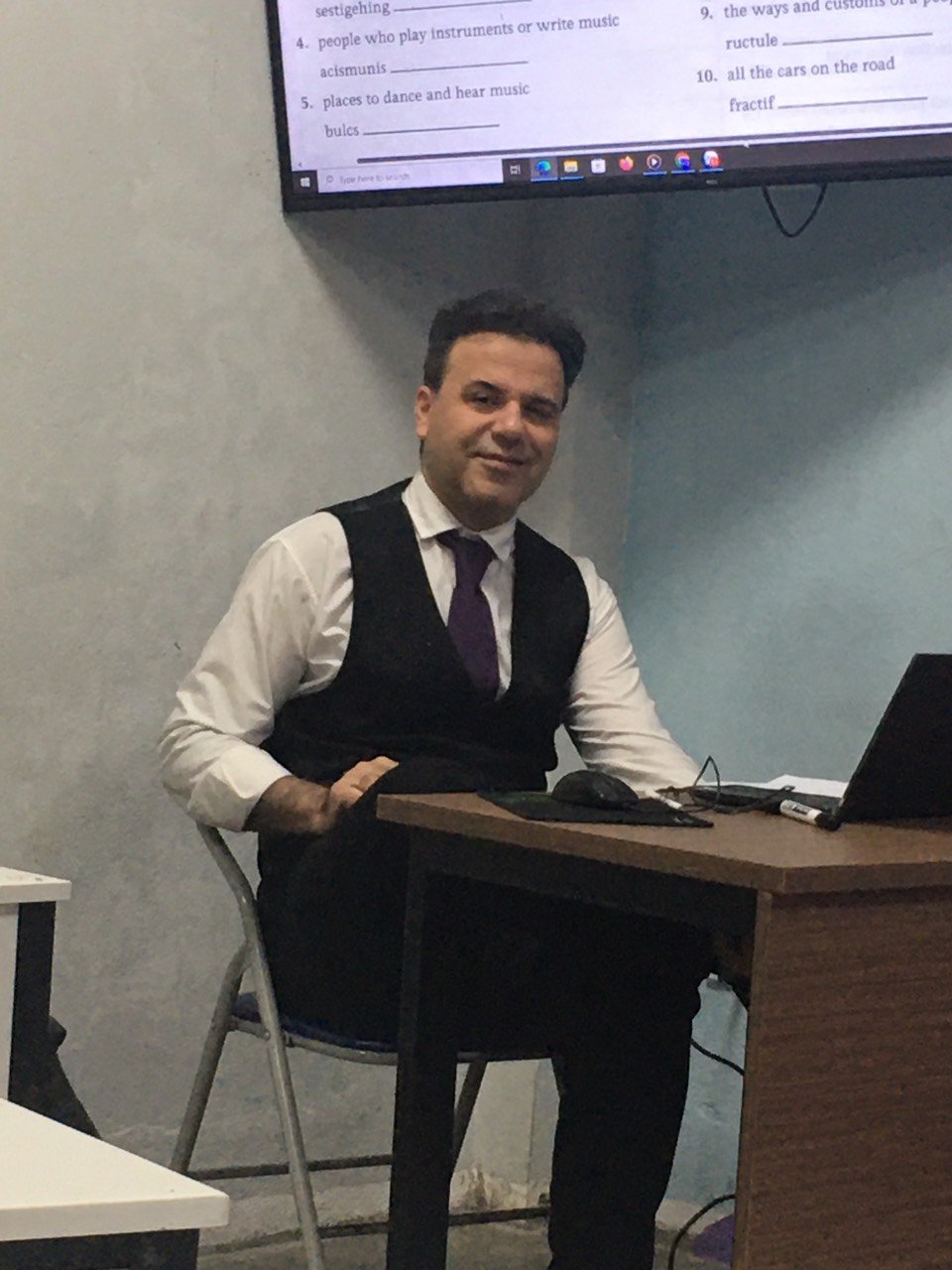

Academic Classes / Class 9 Tuition / International Board / ENGLISH-9 / English-8 International
Shahryar Ghorbani Harsin
Student's Reviews
By Several Parameters
Grade 9 or High School Freshman English course is important because it develops the reasoning capacity and thought process of an individual. It encourages and enables students to read widely and often, acquire a wide vocabulary, and understand grammar and linguistic conventions. It also aligns with the Common Core Standards 0h and prepares students to read and write confidently in all subject areas. This 09the grade English course is a great option for students who want to improve their understanding of the vocabulary skills they’ve been learning in class. The course contains short yet engaging and lessons that simplify 09th grade English concepts, such as Parts of speech, British prose, poems, American Literature and more.
For attending this course, prior knowledge of Grade-08 English is required, this course assumes that students have prior experience with all the topics of English of Grade 08. This is not an introductory class for absolute beginners on English of Grade-09. Participants should already be familiar with the basic English concepts included in the course or syllabus.
| Course | Fee per Class (In KlassCoins) | Duration | Type |
|---|---|---|---|
| English-8 International | 725 | 11 Months | Indiviual Classes |
I am Shahryar Ghorbani Harsin, a Cambridge CELTA-certified English teacher with a master's degree in ELT. Over the past 20 years, I have taught in various schools and language institutes, catering to a diverse range of age groups from young children to adults. My teaching experience encompasses a wide spectrum of general English levels and age groups, although my preference lies in teaching IELTS preparatory courses. I find teaching these courses not only enjoyable but also highly rewarding as it allows me to constantly learn new things. I firmly believe that the key to being a successful teacher is to establish a good rapport with learners and build upon it by effectively sharing and conveying one's English knowledge.
-
Subject Details:
Domain Subject- general English , IELTS preparatory courses all skills.
SKILLS-
- Planning
- preparing and delivering lessons
- providing feedback on oral and written work
- administering examinations and other assessments creating
- Presentations
- Writing
- Speaking
- Listening
- Reading
- English as a Second Language (ESL)
-
Book Published Details:No data found.
-
Language Known:No data found.
-
Total Experiance:20 Years
-
Listening & Questioning Skill:No data found.
-
Reading Skill:No data found.
-
Writing Skill:No data found.
-
Presentation Skill:No data found.
-
Online classes Experiance:3 hours
-
Award Recg:No data found.
-
Research Work:No data found.
Degree: Bachelors of Arts - University: Islamic Azad University
Degree: Masters of Arts - University: Islamic Azad University
Degree:
Grade 9 or High School Freshman English course is important because it develops the reasoning capacity and thought process of an individual. It encourages and enables students to read widely and often, acquire a wide vocabulary, and understand grammar and linguistic conventions. It also aligns with the Common Core Standards 0h and prepares students to read and write confidently in all subject areas. This 09the grade English course is a great option for students who want to improve their understanding of the vocabulary skills they’ve been learning in class. The course contains short yet engaging and lessons that simplify 09th grade English concepts, such as Parts of speech, British prose, poems, American Literature and more.
-
Learning Objectives:
English Language Arts
Ch 1.: Speaking & Listening Skills
Ch 2.: Reading Skills Review
Ch 3.: Reading Skills
Ch 4.: Literary Text Analysis Review
Ch 5.: Literary Text Analysis
Ch 6.: Literary Terms & Devices Review
Ch 7.: Literary Terms & Devices
Ch 8. Short Stories: Cask of Amontillado, Most Dangerous Game, Scarlet Ibis
Ch 9. Epic & Myth: The Odyssey & Perseus and Medusa
Ch 10. Novel Exemplars: Night & Animal Farm
Ch 11. Drama: To Kill a Mockingbird & Romeo and Juliet
Ch 12. Poetry: Hope is the Thing with Feathers, The Raven & In Just
Ch 13. Nonfiction Texts: Gettysburg Address & Washington's Farewell
Ch 14.: Media & Art Analysis
Ch 15.: Word Choice & Tone
Ch 16.: Writing Skills Review
Ch 17.: The Writing Process
Ch 18.: Argumentative Reading & Writing
Ch 19.: Inactive & Technical Writing
Ch 20.: Narrative Writing
Ch 21.: Research Skills
Ch 22. Animal Farm
Ch 23. To Kill a Mockingbird
Ch 24. Romeo and Juliet
American Literature
Ch 1. American Novels
Ch 2. Usage Conventions
Ch 3. Using Source Materials
Ch 4. Identifying Usage Errors
Ch 5. Prose Lesson Plans
Ch 6. Essay Basics Lesson Plans
Ch 7. Literary Terms
Ch 8. Dramatic Literature
Ch 9. Introduction to High School
Ch 10. The Writing Process
Ch 11. Text Analysis & Close Reading Lesson Plans
Ch 12. Ancient Literature
Ch 13. Poetry
Ch 14. Drama
Ch 15. American Short Stories
Ch 16. British Fiction
Ch 17. Capitalization & Spelling
Ch 18. Contemporary Fiction
Ch 19. Elements of Grammar
Ch 20. Punctuation in Writing
-
Course Outline:
ENGLISH LANGUAGE ARTS
Ch 1.: Speaking & Listening SkillsLesson 1 - Coming to a Discussion Prepared
Lesson 2 - How to Contribute to a Discussion
Lesson 3 - Critical Listening & Thinking: Evaluating Others' Speeches
Lesson 4 - Informative Speaking: Purpose and Types
Lesson 5 - Helping Your Audience Learn During Informative Speeches: Strategies & Tips
Lesson 6 - The Style of a Speech: Speaker, Audience & Purpose
Lesson 7 - Using Vocal Qualities to Convey Meaning in Public Speaking
Lesson 8 - Considering Pronunciation, Articulation, and Dialect in Public Speaking
Lesson 9 - The Role of Nonverbal Communication During Speech Delivery
Lesson 10 - Using Visual Aids During Your Speech: Guidelines & Tips
Ch 2.: Reading Skills ReviewLesson 1 - Strategies for Reading Comprehension
Lesson 2 - Improving Reading Comprehension: Tips and Tricks
Lesson 3 - How to Find the Theme or Central Idea
Lesson 4 - What is Inference? - How to Infer Intended Meaning
Lesson 5 - Author's Purpose: Definition & Examples
Ch 3.: Reading SkillsLesson 1 - Drawing Conclusions from a Reading Selection
Lesson 2 - Citing Textual Evidence to Support Analysis
Lesson 3 - Writing an Objective Summary of a Story
Lesson 4 - Finding Specific Details in a Reading Selection
Lesson 5 - How to Make Predictions Based on Information from a Reading Selection
Ch 4.: Literary Text Analysis ReviewLesson 1 - What is the Setting of a Story?
Lesson 2 - How Setting Shapes the Characters & Plot
Lesson 3 - How Story Elements Interact & Shape One Another
Lesson 4 - What is a Character Trait? - Definition & Examples
Lesson 5 - Methods of Characterization in Literature
Lesson 6 - Style in Fiction: Dialect & Figures of Speech
Ch 5.: Literary Text AnalysisLesson 1 - How to Analyse a Literary Passage: A Step-by-Step Guide
Lesson 2 - Literary Forms & Genres: How They Affect Meaning
Lesson 3 - What is Plot? - Examples & Definition
Lesson 4 - How Dialogue Reveals Aspects of a Character
Lesson 5 - What is Theme in Literature? - Definition & Examples
Lesson 6 - Sources of Modern Fiction: Myths, Traditional Stories & Religious Works
Ch 6.: Literary Terms & Devices ReviewLesson 1 - Literary Devices: Definition & Examples
Lesson 2 - What is a Flashback in Literature? - Definition & Examples
Lesson 3 - What is Symbolism in Literature? - Definition, Types & Examples
Lesson 4 - Types of Irony: Examples & Definitions
Ch 7.: Literary Terms & DevicesLesson 1 - Personification and Apostrophe: Differences & Examples
Lesson 2 - Allegory in Literature: History, Definition & Examples
Lesson 3 - Oxymoron in Literature: Definition, Purpose & Examples
Lesson 4 - Sarcasm in Literature: Example & Explanation
Ch 8. Short Stories: Cask of Amontillado, Most Dangerous Game, Scarlet IbisLesson 1 - Elements of a Short Story
Lesson 2 - Poe's The Cask of Amontillado: Summary and Analysis
Lesson 3 - The Most Dangerous Game: Summary and Themes
Lesson 4 - The Scarlet Ibis: Summary, Setting & Themes
Ch 9. Epic & Myth: The Odyssey & Perseus and MedusaLesson 1 - Epic Poetry: Definition, Heroes & Stories
Lesson 2 - The Odyssey: Greek Epic
Lesson 3 - Is Odysseus a Hero? - Character Analysis
Lesson 4 - Themes of The Odyssey
Lesson 5 - Important Quotes from The Odyssey
Lesson 6 - What Are Myths? - Definition, Types & Examples
Lesson 7 - Greek Myth of Perseus and Medusa: Summary & Overview
Ch 10. Novel Exemplars: Night & Animal FarmLesson 1 - Elie Wiesel's Night: Summary, History & Quotes
Lesson 2 - Setting of Night by Elie Wiesel
Lesson 3 - Elie Wiesel's Night: Themes & Imagery
Lesson 4 - Figurative Language in Night by Elie Wiesel
Lesson 5 - Tone of Night by Elie Wiesel
Lesson 6 - Animal Farm: Plot Summary
Lesson 7 - Animal Farm Themes
Lesson 8 - Figurative Language in Animal Farm
Ch 11. Drama: To Kill a Mockingbird & Romeo and Juliet
Lesson 1 - To Kill a Mockingbird: Themes, Symbols & Imagery
Lesson 2 - Literary Devices in To Kill a Mockingbird: Allusions & Irony
Lesson 3 - Elements of Drama: Characters, Plot, Setting & Symbolism
Lesson 4 - Drama Structure: Acts, Scenes, Prologue & Epilogue
Lesson 5 - Identifying Stage Directions in a Drama
Lesson 6 - Tragedy in Drama: Classical to Modern
Lesson 7 - Romeo and Juliet: Shakespeare's Famous Star-Crossed Lovers
Lesson 8 - Characterization in Romeo & Juliet
Lesson 9 - Themes in Romeo and Juliet
Lesson 10 - Motifs and Symbols in Romeo and Juliet
Lesson 11 - Literary Devices in Romeo and Juliet
Ch 12. Poetry: Hope is the Thing with Feathers, The Raven & In JustLesson 1 - Glossary of Literary Terms: Poetry
Lesson 2 - Consonance, Assonance, and Repetition: Definitions & Examples
Lesson 3 - Emily Dickinson's Hope is the Thing with Feathers: Summary, Analysis & Theme
Lesson 4 - Edgar Allan Poe's The Raven: Summary and Analysis
Lesson 5 - In Just by ee cummings: Poem Analysis
Ch 13. Nonfiction Texts: Gettysburg Address & Washington's FarewellLesson 1 - Implied Main Idea: Definition & Examples
Lesson 2 - How to Explain the Main Point through Supporting Details
Lesson 3 - Analysing Sequence of Events in an Informational Text
Lesson 4 - Analysing Structure in an Informational Text
Lesson 5 - How Supplemental Features Add to an Informational Text
Lesson 6 - Fact vs. Persuasion vs. Informed Opinion in Nonfiction
Lesson 7 - Gettysburg Address: Summary & Analysis
Lesson 8 - George Washington's Farewell Address
Ch 14.: Media & Art AnalysisLesson 1 - Finding Meaning in Visual Media: Strategies & Examples
Lesson 2 - Understanding Performance Art: Finding the Thesis, Narrative & Meaning
Lesson 3 - How to Write in Response to Other Art FormsCh 15.: Word Choice & Tone
Lesson 1 - Understanding Tone and Mood in a Reading Passage
Lesson 2 - What Are Connotation and Denotation? - Definitions & Examples
Lesson 3 - Constructing Meaning with Context Clues, Prior Knowledge & Word Structure
Lesson 4 - Understanding Words by Their Relationships
Lesson 5 - Using Reference Materials for Vocabulary
Ch 16.: Writing Skills ReviewLesson 1 - Writing: Main Idea, Thesis Statement & Topic Sentences
Lesson 2 - How to Write Strong Transitions and Transitional Sentences
Lesson 3 - Choosing How to Organize Your Writing: Task, Purpose & Audience
Lesson 4 - Writing Revision: How to Fix Mistakes in Your Writing
Lesson 5 - Commonly Confused Words in English
Lesson 6 - Writing in a Formal & Objective Tone
Lesson 7 - Components of a Business Letter
Ch 17.: The Writing ProcessLesson 1 - Effective Prewriting: Instructions and Examples
Lesson 2 - How to Organize an Essay
Lesson 3 - How to Structure Paragraphs in an Essay
Lesson 4 - How to Structure Sentences in an Essay
Lesson 5 - What is Writing Style? - Types & Examples
Lesson 6 - How to Write Better by Improving Your Sentence Structure
Lesson 7 - How to Proofread an Essay for Spelling and Grammar
Lesson 8 - How to Edit and Improve Essay Content
Lesson 9 - Editing for Mechanics: Definition & Concept
Lesson 10 - Editing for Content: Definition & Concept
Ch 18.: Argumentative Reading & WritingLesson 1 - Topic vs. Argument in a Reading Passage
Lesson 2 - How to Write a Great Argument
Lesson 3 - How to Structure an Argument in Your Essay
Lesson 4 - Parts of An Argument: Claims, Counterclaims, Reasons, and Evidence
Lesson 5 - Concluding Statements: Supporting Your Argument
Lesson 6 - How to Analyse an Argument's Effectiveness & Validity
Lesson 7 - Recognizing Biases, Assumptions & Stereotypes in Written Works
Lesson 8 - Evaluating Rhetorical Devices in Writing
Ch 19.: Informative & Technical WritingLesson 1 - How to Write an Informative Essay
Lesson 2 - Basic Essay Structure: The Five-Paragraph Essay
Lesson 3 - Organizing and Categorizing Ideas, Concepts and Information
Lesson 4 - How to Use Sources to Write Essays and Evaluate Evidence
Lesson 5 - Organizational Features of Expository Texts
Lesson 6 - The Importance of Using Precise Language in Writing
Lesson 7 - How to Write Effective Conclusions: Importance and Elements
Lesson 8 - Compare & Contrast Essay: Definition, Topics & Examples
Lesson 9 - Technical Communication: Definition & Purpose
Ch 20.: Narrative WritingLesson 1 - Narrative Essay: Definition, Examples & Characteristics
Lesson 2 - What is a Narrative Hook? - Definition & Examples
Lesson 3 - Narrative Techniques: Dialogue, Pacing, Description & Reflection
Lesson 4 - How to Use Descriptive Details & Sensory Language in Your Writing
Lesson 5 - Concluding Your Narrative with Reflection
Ch 21.: Research SkillsLesson 1 - Finding & Evaluating Sources for Research
Lesson 2 - How to Use Reference Material in Your Writing
Lesson 3 - Quoting, Paraphrasing and Summarizing Your Research
Lesson 4 - How to Make In-Text Citations
Lesson 5 - What is MLA Format?
Lesson 6 - APA Citation: Formats & Examples
Lesson 7 - How to Make a Works Cited Page
American Literature
Ch 1. American Novels
Ch 2. Usage Conventions
Ch 3. Using Source Materials
Ch 4. Identifying Usage Errors
Ch 5. Prose Lesson Plans
Ch 6. Essay Basics Lesson Plans
Ch 7. Literary Terms
Ch 8. Dramatic Literature
Ch 9. Introduction to High School
Ch 10. The Writing Process
Ch 11. Text Analysis & Close Reading Lesson Plans
Ch 12. Ancient Literature
Ch 13. Poetry
Ch 14. Drama
Ch 15. American Short Stories
Ch 16. British Fiction
Ch 17. Capitalization & Spelling
Ch 18. Contemporary Fiction
Ch 19. Elements of Grammar
Ch 20. Punctuation in Writing -
Recomended Audience:
The audience of this course is students of Grade-09 from International Board of USA, Canada, UK, Australia, New Zealand, Ireland, Singapore etc. All the Chapters are well designed and its coverage as per International Board, Still Student have completed flexibility to enhance or modify the course coverage during the course of learning process with Teacher. We are expecting that students of Grade-09 should drive their classes with Teacher as per chapters mentioned and also as per syllabus of their school and applicable School district or Board.
-
Pre-Requisite Requirement:
For attending this course, prior knowledge of Grade-08 English is required, this course assumes that students have prior experience with all the topics of English of Grade 08. This is not an introductory class for absolute beginners on English of Grade-09. Participants should already be familiar with the basic English concepts included in the course or syllabus.
-
Course Level:Expert
-
Language of Teaching:English
-
Class Schedule Availiability:Afternoon





